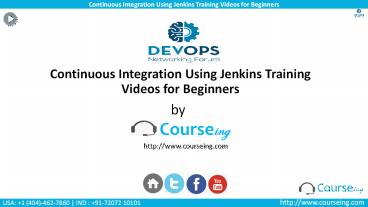DevOps Training Continuous Integration Using Jenkins - PowerPoint PPT Presentation
Title:
DevOps Training Continuous Integration Using Jenkins
Description:
DevOps Training Continuous Integration Using Jenkins Tutorial Covers Importance Of Continuous Integration,DevOps Build Cycle Architecture,DevOps Process and Marketing Tools Architecture Jenkins,Jenkins Vs Other Continuous Integration Tools,Jenkins On Stand-Alone And Application Server topics indepth manner also access devops free resources – PowerPoint PPT presentation
Number of Views:245
Title: DevOps Training Continuous Integration Using Jenkins
1
Continuous Integration Using Jenkins Training
Videos for Beginners
by
http//www.courseing.com
2
Highlights
- Importance Of Continuous Integration
- DevOps Build Cycle Architecture
- DevOps Process and Marketing Tools Architecture
- Jenkins
- Jenkins Vs Other Continuous Integration Tools
- Jenkins On Stand-Alone And Application Server
3
Importance Of Continuous Integration
- Continuous Integration is a software development
process where team members integrate their work
often. - Every integration is verified by an automated
build to detect integration errors as soon as
possible. - Ensures software is built and tested regularly
and release bug-fixes rapidly. - Identifies defects early in the development,
complex and easy to resolve. - Tests code against the current state and always
in the same environment.
4
Importance Of Continuous Integration
- Increase Code Coverage or visibility across the
team members. - Deploys code directly to a central staging,
pre-production or production environment. - Provides parallel build support which consume
fewer local resources. - Triggers build and compilation processes waiting
for the build to finish. - Tests the code and merges only when no errors
found. - Decreases the code review time
5
DevOps Build Cycle Architecture
Source Wikipedia
6
DevOps Process and Marketing Tools Architecture
Source Google
7
Jenkins
- Jenkins is mainly a set of Java classes that
model software development build system. It is
an open source automation server written in Java. - Assists to automate the non-human part of the
complete software development process. - Empowers development , operations teams to
implement the technical part of a Continuous
Delivery. - Jenkins contains classes like Project, Build
which are derive from Hudson Object model.
8
Jenkins Vs Other Continuous Integration Tools
- Continuous integration(CI) is the very important
part of modern software development life
cycle(SDLC). - Development and testing techniques have become
more complex so there is a need in a unique
software to handle, ensure software delivery. - Jenkins is the foremost open source continuous
integration tool. - Jenkins have many plug-ins to provide extra
integrations and it is free, open source and
modular. Supports Version Control Systems,
Builders, and Notifications publishers like Git
publisher, Email, and Git hub commit.
9
Jenkins On Stand-Alone And Application Server
- We can run Jenkins server in two ways
- 1. stand-alone application, or deployed as a
standard web application. - 2. Application server such as Tomcat, JBoss, or
Glass Fish. - It is easy to set up and maintain Jenkins as
standalone. - Jenkins uses the lightweight Winstone servlet
engine to run the server out of the box. - Running Jenkins as a stand-alone server, that
makes users able to install plug-ins and upgrades
easily.
10
Feedback
Like It ? Hate It?
We would love to hear from you whatever you think
about the course.
Click HERE to share what you think!
11
Thank you
Thank You for Watching Continuous Integration
Using Jenkins Training Videos for Beginners by
http//www.courseing.com































